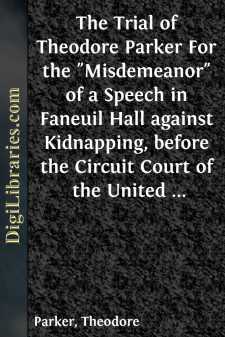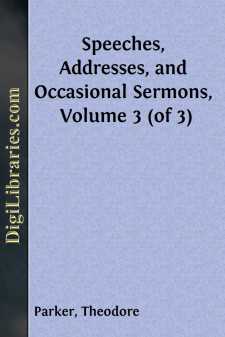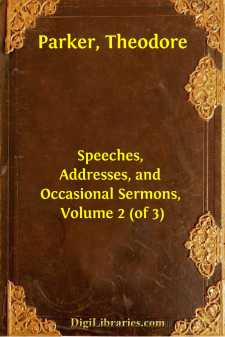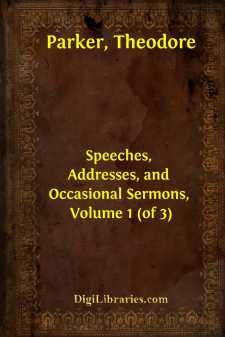Categories
- Antiques & Collectibles 13
- Architecture 36
- Art 48
- Bibles 22
- Biography & Autobiography 813
- Body, Mind & Spirit 142
- Business & Economics 28
- Children's Books 15
- Children's Fiction 12
- Computers 4
- Cooking 94
- Crafts & Hobbies 4
- Drama 346
- Education 46
- Family & Relationships 57
- Fiction 11828
- Games 19
- Gardening 17
- Health & Fitness 34
- History 1377
- House & Home 1
- Humor 147
- Juvenile Fiction 1873
- Juvenile Nonfiction 202
- Language Arts & Disciplines 88
- Law 16
- Literary Collections 686
- Literary Criticism 179
- Mathematics 13
- Medical 41
- Music 40
- Nature 179
- Non-Classifiable 1768
- Performing Arts 7
- Periodicals 1453
- Philosophy 64
- Photography 2
- Poetry 896
- Political Science 203
- Psychology 42
- Reference 154
- Religion 513
- Science 126
- Self-Help 84
- Social Science 81
- Sports & Recreation 34
- Study Aids 3
- Technology & Engineering 59
- Transportation 23
- Travel 463
- True Crime 29
The Trial of Theodore Parker For the "Misdemeanor" of a Speech in Faneuil Hall against Kidnapping, before the Circuit Court of the United States, at Boston, April 3, 1855, with the Defence
by: Theodore Parker
Description:
Excerpt
TO THE PEOPLE OF THE FREE STATES OF AMERICA.
Fellow-Citizens and Friends,—
If it were a merely personal matter for which I was arraigned before the United States Court, after the trial was over I should trouble the public no further with that matter; and hitherto indeed, though often attacked, nay, almost continually for the last fourteen years, I have never returned a word in defence. But now, as this case is one of such vast and far-reaching importance, involving the great Human Right to Freedom of Speech, and as the actual question before the court was never brought to trial, I cannot let the occasion pass by without making further use of it.
When Judge Curtis delivered his charge to the Grand-Jury, June 7th, 1854, I made ready for trial, and in three or four days my line of defence was marked out—the fortifications sketched, the place of the batteries determined; I began to collect arms, and was soon ready for his attack. When that Grand-Jury, summoned with no special reference to me, refused to find a bill and were discharged, I took public notice of the conduct of Judge Curtis, in a Sermon for the Fourth of July. But I knew the friends of the fugitive slave bill at Boston and Washington too well to think they would let the matter sleep; I knew what arts could be used to pack a jury and procure a bill. So I was not at all surprised when I heard of the efforts making by the Slave Power in Boston to obtain an indictment by another grand-jury summoned for that purpose. It need not be supposed that I was wholly ignorant of their doings from day to day. The arrest was no astonishment to me. I knew how much the reputation of this Court and of its Attorney depended on the success of this prosecution. I knew what private malignity was at work.
After my arraignment I made elaborate preparation for my defence. I procured able counsel, men needing no commendation, to manage the technical details which I knew nothing about and so could not meddle with, while I took charge of other matters lying more level to my own capacity. I thought it best to take an active part in my own defence,—for the matter at issue belonged to my previous studies and general business; my personal friends and the People in general, seemed to expect me to defend myself as well as I could.
A great political revolution took place between the Judge's charge and my arraignment, June 7th, and November 29th, 1854, and I thought the Court would not allow the case to come to open argument. For certainly, it would not be a very pleasant thing for Judge Sprague and Judge Curtis, who have taken such pains to establish slavery in Massachusetts, to sit there—each like a travestied Prometheus, chained up in a silk gown because they had brought to earth fire from the quarter opposite to Heaven—and listen to Mr. Hale, and Mr. Phillips and other anti-slavery lawyers, day after day: there were facts, sure to come to light, not honorable to the Court and not pleasant to look at in the presence of a New England community then getting indignant at the outrages of the Slave Power....






